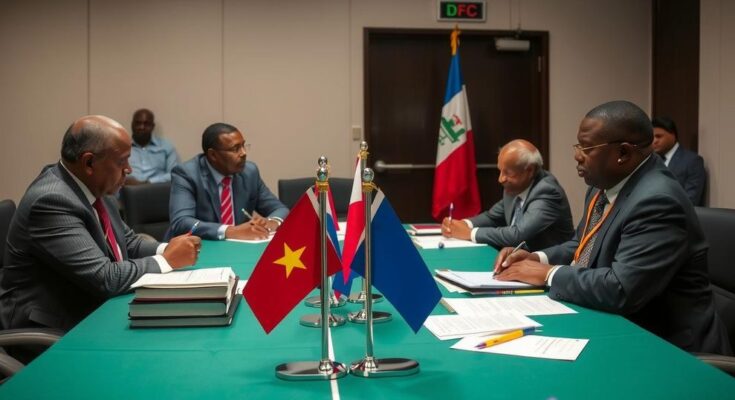The UN Security Council was briefed on the urgent need to end violence in eastern DRC, focusing on the political unrest and the influence of armed groups like ADF and M23. UN Special Representative Bintou Keita hailed peace initiatives from Angola and highlighted crucial governance reforms. The humanitarian crisis remains severe, emphasizing the essential role of addressing gender-based violence and amplifying the voices of marginalized communities for future peace efforts.
On Monday, the UN Special Representative for the Democratic Republic of the Congo (DRC), Bintou Keita, briefed the Security Council on the urgent need to address the ongoing violence, particularly in the eastern regions. Her report highlighted political challenges surrounding constitutional reform and the escalating insecurity in North Kivu and Ituri, attributed to the activities of armed groups such as ADF, M23, CODECO, and Zaïre. Ms. Keita praised the mediation efforts led by Angola, referencing the upcoming December summit between Angolan, Congolese, and Rwandan leaders as a pivotal moment for peace initiatives.
While acknowledging the progress made through the Luanda process and the recent ceasefire agreement with Rwanda, she emphasized that to achieve lasting stability, local, provincial, and national initiatives must align with international support. Ms. Keita also focused on governance reforms aimed at improving public services and security apparatus, urging stakeholders to mitigate tensions related to potential constitutional revisions.
The security situation remains precarious, especially in North Kivu, where the M23 has significantly expanded its territorial control, and the ADF continues to pose a lethal threat to civilians. Although recent months have seen a reduced number of attacks from CODECO and Zaïre, the challenges of civilian protection and the exploitation of natural resources by armed groups persist. Furthermore, the humanitarian circumstances are severe, with nearly 6.4 million individuals displaced due to conflicts and ongoing climatic challenges exacerbating the crisis. Reports indicate an increase in funding for humanitarian efforts in the DRC, which marks improvement in response strategies.
Notably, Ms. Keita shed light on the alarming issue of gender-based violence, reporting over 90,000 cases documented this year, predominantly in North Kivu. Her remarks included commendations for the DRC Government’s actions towards battling impunity and advancing survivor reparations. Furthermore, she underscored the significance of amplifying calls for peace from women and persons with disabilities, who are ardently seeking restoration of dignity and security in their homes and communities.
The ongoing conflict in the eastern Democratic Republic of the Congo (DRC) has been deeply rooted in political instability, ethnic tensions, and the struggle for control over rich natural resources. This region has been marred by violence from various armed groups, leading to significant humanitarian crises and displacement of civilians. Recent international efforts, such as the Luanda process and the Nairobi initiative, aim to mediate peace and restore stability. The UN Stabilization Mission in the DRC (MONUSCO) works alongside these initiatives while addressing both security and humanitarian needs within the afflicted communities.
The Security Council meeting underscored the dire need for concerted efforts to combat violence and promote stability in the eastern DRC. While notable progress has been achieved, significant challenges persist due to the influence of armed groups and the humanitarian situation’s deterioration. The integration of local and international support is vital for fostering lasting peace and security in the region. Furthermore, it is crucial to address the pervasive issue of gender-based violence, ensuring that all voices, particularly those of women and marginalized communities, are included in peacebuilding efforts.
Original Source: news.un.org




